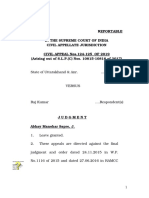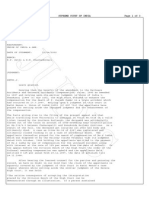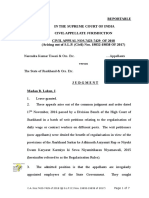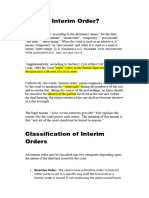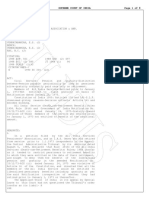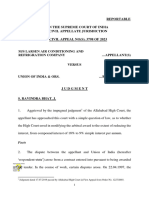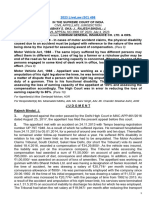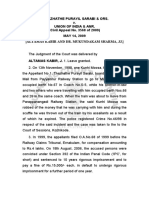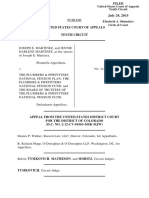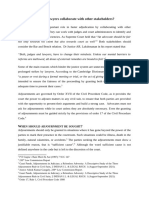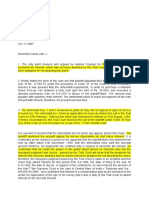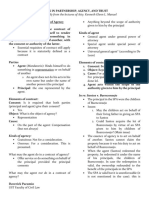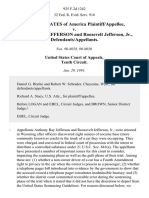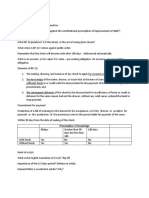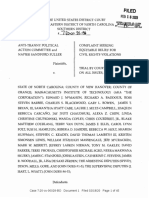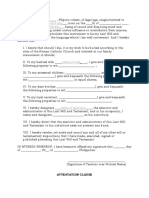Notional Increment
Notional Increment
Uploaded by
iasdurgeshtrivediCopyright:
Available Formats
Notional Increment
Notional Increment
Uploaded by
iasdurgeshtrivediOriginal Description:
Original Title
Copyright
Available Formats
Share this document
Did you find this document useful?
Is this content inappropriate?
Copyright:
Available Formats
Notional Increment
Notional Increment
Uploaded by
iasdurgeshtrivediCopyright:
Available Formats
Union Of India & Anr vs Tarsem Singh on 13 August, 2008
Union Of India & Anr vs Tarsem Singh on 13 August, 2008
Equivalent citations: AIRONLINE 2008 SC 68, (2008) 4 RAJ LW 3167, (2009) 1
MAD LW 986, (2008) 6 SERV LR 440, 2008 (8) SCC 648, (2009) 1 SERV LJ 371,
(2008) 7 MAD LJ 1245, (2008) 4 SCT 19, (2008) ILR 4 KER 752, (2008) 11
SCALE 594, (2008) 118 FAC LR 1079, (2009) 1 KER LT 101, (2008) 71 ALL IND
CAS 61 (SC), (2008) 71 ALLINDCAS 61, (2008) ILR 4 SC 752
Author: R.V.Raveendran
Bench: Lokeshwar Singh Panta, R. V. Raveendran
Reportable
IN THE SUPREME COURT OF INDIA
CIVIL APPELLATE JURISDICTION
CIVIL APPEAL NO.5151-5152 OF 2008
(Arising out of SLP [C] Nos.3820-3821 of 2008)
Union of India & Ors. ... Appellants
Vs.
Tarsem Singh ... Respondent
ORDER
R.V.RAVEENDRAN, J.
Leave granted. Heard learned counsel for the parties.
2. The respondent while working in the Indian Army was invalidated out of Army service, in medical
category, on 13.11.1983. He approached the High Court in 1999 seeking a direction to the appellants
to pay him disability pension. A learned Single Judge by order dated 6.12.2000 allowed the writ
petition and directed the appellants to grant him disability pension at the rates permissible. In so far
as arrears, the relief was restricted to 38 months prior to the filing of the writ petition. The
respondent was also directed to appear before the Re-survey Medical Board as and when called
upon by the appellants. The appellants did not contest the said decision and granted disability
Indian Kanoon - http://indiankanoon.org/doc/26187086/ 1
Union Of India & Anr vs Tarsem Singh on 13 August, 2008
pension to respondents and also released the arrears of disability pension for 38 months.
3. The respondent however was not satisfied. According to him the disability pension ought to be
paid from the date it fell due on 13.11.1983. He therefore filed a Letters Patent Appeal. The said
appeal was allowed by the Division Bench of the High Court by judgment dated 6.12.2006. The
Division Bench held that the respondent was entitled to disability pension from the date it fell due,
and it should not be restricted to a period of three years and two months prior to the filing of the
writ petition. By a subsequent modification order dated 23.2.2007, the Division Bench also granted
interest on the arrears at the rate of 6% per annum. The said judgment and order of the Division
Bench is challenged in this appeal. The only question that therefore arises for our consideration is
whether the High Court was justified in directing payment of arrears for a period of 16 years instead
of restricting it to three years.
4. The principles underlying continuing wrongs and recurring/ successive wrongs have been applied
to service law disputes. A `continuing wrong' refers to a single wrongful act which causes a
continuing injury. `Recurring/successive wrongs' are those which occur periodically, each wrong
giving rise to a distinct and separate cause of action. This Court in Balakrishna S.P. Waghmare vs.
Shree Dhyaneshwar Maharaj Sansthan - [AIR 1959 SC 798], explained the concept of continuing
wrong (in the context of section 23 of Limitation Act, 1908 corresponding to section 22 of Limitation
Act, 1963) :
"It is the very essence of a continuing wrong that it is an act which creates a
continuing source of injury and renders the doer of the act responsible and liable for
the continuance of the said injury. If the wrongful act causes an injury which is
complete, there is no continuing wrong even though the damage resulting from the
act may continue. If, however, a wrongful act is of such a character that the injury
caused by it itself continues, then the act constitutes a continuing wrong. In this
connection, it is necessary to draw a distinction between the injury caused by the
wrongful act and what may be described as the effect of the said injury."
In M. R. Gupta vs. Union of India [1995 (5) SCC 628], the appellant approached the High Court in
1989 with a grievance in regard to his initial pay fixation with effect from 1.8.1978. The claim was
rejected as it was raised after 11 years. This Court applied the principles of continuing wrong and
recurring wrongs and reversed the decision. This Court held :
"The appellant's grievance that his pay fixation was not in accordance with the rules,
was the assertion of a continuing wrong against him which gave rise to a recurring
cause of action each time he was paid a salary which was not computed in accordance
with the rules. So long as the appellant is in service, a fresh cause of action arises
every month when he is paid his monthly salary on the basis of a wrong computation
made contrary to rules. It is no doubt true that if the appellant's claim is found
correct on merits, he would be entitled to be paid according to the properly fixed pay
scale in the future and the question of limitation would arise for recovery of the
arrears for the past period. In other words, the appellant's claim, if any, for recovery
Indian Kanoon - http://indiankanoon.org/doc/26187086/ 2
Union Of India & Anr vs Tarsem Singh on 13 August, 2008
of arrears calculated on the basis of difference in the pay which has become time
barred would not be recoverable, but he would be entitled to proper fixation of his
pay in accordance with rules and to cessation of a continuing wrong if on merits his
claim is justified. Similarly, any other consequential relief claimed by him, such as,
promotion etc., would also be subject to the defence of laches etc. to disentitle him to
those reliefs. The pay fixation can be made only on the basis of the situation existing
on 1.8.1978 without taking into account any other consequential relief which may be
barred by his laches and the bar of limitation. It is to this limited extent of proper pay
fixation, the application cannot be treated as time barred........."
In Shiv Dass vs. Union of India - 2007 (9) SCC 274, this Court held:
"The High Court does not ordinarily permit a belated resort to the extraordinary
remedy because it is likely to cause confusion and public inconvenience and bring in
its train new injustices, and if writ jurisdiction is exercised after unreasonable delay,
it may have the effect of inflicting not only hardship and inconvenience but also
injustice on third parties. It was pointed out that when writ jurisdiction is invoked,
unexplained delay coupled with the creation of third party rights in the meantime is
an important factor which also weighs with the High Court in deciding whether or
not to exercise such jurisdiction.
In the case of pension the cause of action actually continues from month to month.
That, however, cannot be a ground to overlook delay in filing the petition.......... If
petition is filed beyond a reasonable period say three years normally the Court would
reject the same or restrict the relief which could be granted to a reasonable period of
about three years."
5. To summarise, normally, a belated service related claim will be rejected on the ground of delay
and laches (where remedy is sought by filing a writ petition) or limitation (where remedy is sought
by an application to the Administrative Tribunal). One of the exceptions to the said rule is cases
relating to a continuing wrong. Where a service related claim is based on a continuing wrong, relief
can be granted even if there is a long delay in seeking remedy, with reference to the date on which
the continuing wrong commenced, if such continuing wrong creates a continuing source of injury.
But there is an exception to the exception. If the grievance is in respect of any order or
administrative decision which related to or affected several others also, and if the re-opening of the
issue would affect the settled rights of third parties, then the claim will not be entertained. For
example, if the issue relates to payment or re-fixation of pay or pension, relief may be granted in
spite of delay as it does not affect the rights of third parties. But if the claim involved issues relating
to seniority or promotion etc., affecting others, delay would render the claim stale and doctrine of
laches/limitation will be applied. In so far as the consequential relief of recovery of arrears for a past
period, the principles relating to recurring/successive wrongs will apply. As a consequence, High
Courts will restrict the consequential relief relating to arrears normally to a period of three years
prior to the date of filing of the writ petition.
Indian Kanoon - http://indiankanoon.org/doc/26187086/ 3
Union Of India & Anr vs Tarsem Singh on 13 August, 2008
6. In this case, the delay of 16 years would affect the consequential claim for arrears. The High Court
was not justified in directing payment of arrears relating to 16 years, and that too with interest. It
ought to have restricted the relief relating to arrears to only three years before the date of writ
petition, or from the date of demand to date of writ petition, whichever was lesser. It ought not to
have granted interest on arrears in such circumstances.
7. In view of the above, these appeals are allowed. The order of the Division Bench directing
payment of disability pension from the date it fell due, is set aside. As a consequence, the order of
the learned Single Judge is restored.
................................J [R. V. Raveendran] ................................J [Lokeshwar Singh Panta] New Delhi;
August 13, 2008.
Indian Kanoon - http://indiankanoon.org/doc/26187086/ 4
You might also like
- Title 4 Flag Says You're SchwagDocument101 pagesTitle 4 Flag Says You're SchwagJack Canterbury100% (25)
- Pakyaw AgreementDocument1 pagePakyaw AgreementVincent John Lao91% (11)
- SAFE - Welton Arrest WarrantDocument11 pagesSAFE - Welton Arrest Warrantrj3301aNo ratings yet
- Supreme CourtDocument5 pagesSupreme CourtLive LawNo ratings yet
- 7628 2017 Judgement 07-Jan-2019Document9 pages7628 2017 Judgement 07-Jan-2019Nandani AnandNo ratings yet
- Bharat Mata Saraswati Bal MandiDocument5 pagesBharat Mata Saraswati Bal MandiMUKUND MORENo ratings yet
- Supreme Court of IndiaDocument3 pagesSupreme Court of IndiaSatishthakurr ThakurrNo ratings yet
- N. Parameswaran Pillai & Anr. vs. Union of India & Anr 12-4-2002 (12%)Document3 pagesN. Parameswaran Pillai & Anr. vs. Union of India & Anr 12-4-2002 (12%)himanshuextraNo ratings yet
- OA 123 of 2017Document14 pagesOA 123 of 2017Anand100% (1)
- Gayatri Balaswamy Vs ISG Novasoft Technologies LtdT142318COM619766Document32 pagesGayatri Balaswamy Vs ISG Novasoft Technologies LtdT142318COM619766R ManimaranNo ratings yet
- Reasoned Decision: M. J. Sivani v. St. of Karnataka (1995) 6 SCC 289Document21 pagesReasoned Decision: M. J. Sivani v. St. of Karnataka (1995) 6 SCC 289Gopal GaurNo ratings yet
- A Note On Section 5 of The Limitation Act, 1963 - Articles On Law PDFDocument5 pagesA Note On Section 5 of The Limitation Act, 1963 - Articles On Law PDFToheedullahNo ratings yet
- Arup Bhuyan Vs State of Assam 26082014 SCs140846COM154134Document6 pagesArup Bhuyan Vs State of Assam 26082014 SCs140846COM154134Fawaz ShaheenNo ratings yet
- Geo Miller & Co. Pvt. Ltd. vs. Chairman, Rajasthan Vidyut Utpadan Nigam Ltd.Document10 pagesGeo Miller & Co. Pvt. Ltd. vs. Chairman, Rajasthan Vidyut Utpadan Nigam Ltd.Flab ThugsNo ratings yet
- Ditto 1Document7 pagesDitto 1Daya RamNo ratings yet
- Article On Condonation of Delay, Restoration of Suit, and Seetting Aside Exparte Orders - YSRDocument16 pagesArticle On Condonation of Delay, Restoration of Suit, and Seetting Aside Exparte Orders - YSRY.Srinivasa RaoNo ratings yet
- State of Orissa and Ors Vs Balaram Sahu and Ors 29s020895COM864645Document6 pagesState of Orissa and Ors Vs Balaram Sahu and Ors 29s020895COM864645Umar AzamNo ratings yet
- UOI v. UNITED PLANTERS ASSOCIATION OF SOUTHERN INDIA ETC & ORS.Document8 pagesUOI v. UNITED PLANTERS ASSOCIATION OF SOUTHERN INDIA ETC & ORS.Anika MittalNo ratings yet
- Interim OrderDocument13 pagesInterim OrderAdv SuranyaNo ratings yet
- Judgement2021 09 30Document7 pagesJudgement2021 09 30pahemoviedownloadNo ratings yet
- MC Mehta and Ors Vs Union of India UOI and Ors 201s860092COM97214Document14 pagesMC Mehta and Ors Vs Union of India UOI and Ors 201s860092COM97214Abhishek SadhwaniNo ratings yet
- 13 United India Insurance1652250615Document17 pages13 United India Insurance1652250615tripathiujjwal845No ratings yet
- Union of India vs. Radha YadavDocument8 pagesUnion of India vs. Radha YadavLatest Laws TeamNo ratings yet
- Arbitrator Cannot Go Beyond Point of ReferenceDocument4 pagesArbitrator Cannot Go Beyond Point of Referencesneh guptaNo ratings yet
- Bharat Barrel and Drum MFG Company Private LTD ands710502COM177090Document11 pagesBharat Barrel and Drum MFG Company Private LTD ands710502COM177090Aman BajajNo ratings yet
- ADV ALTAF SB Crusher Matter.Document9 pagesADV ALTAF SB Crusher Matter.ahtshamNo ratings yet
- Supreme Court of India Page 1 of 8Document8 pagesSupreme Court of India Page 1 of 8Samraggi DuttaNo ratings yet
- State of Maharashtra v. Madhukar Balkrishna PDFDocument7 pagesState of Maharashtra v. Madhukar Balkrishna PDFSandeep Kumar VermaNo ratings yet
- Vijay Prakash Singh Vs Union of India Others On 27 July 2018Document4 pagesVijay Prakash Singh Vs Union of India Others On 27 July 2018Prateek RaiNo ratings yet
- Legal Successors of Deceased Employee Insured Under ESI Act, 1948 Not Entitled For Compensation Under Workmen Compensation Act, 1923Document8 pagesLegal Successors of Deceased Employee Insured Under ESI Act, 1948 Not Entitled For Compensation Under Workmen Compensation Act, 1923Live LawNo ratings yet
- Supreme Court of India CasesDocument10 pagesSupreme Court of India CasesPrayansh JainNo ratings yet
- Digilegal 1731730103399Document9 pagesDigilegal 1731730103399Nasir MasihNo ratings yet
- C A NO.6770/2013 at SLP (CL No. 1427 of 2009Document16 pagesC A NO.6770/2013 at SLP (CL No. 1427 of 2009SUSHIL KUMARNo ratings yet
- Larsen Air ConditioningDocument10 pagesLarsen Air Conditioningjyotitated.170No ratings yet
- Supreme Court Judgment On Voluntary Retirement SchemeDocument40 pagesSupreme Court Judgment On Voluntary Retirement SchemeLatest Laws TeamNo ratings yet
- 498-sarnam-singh-v-shriram-general-insurance-4-jul-2023-480019 (1)Document3 pages498-sarnam-singh-v-shriram-general-insurance-4-jul-2023-480019 (1)navnimNo ratings yet
- Paragraph 17Document14 pagesParagraph 17Avinash DangwalNo ratings yet
- 158 State of Rajasthan V Tejmal Choudhary 16 Dec 2021 409579Document6 pages158 State of Rajasthan V Tejmal Choudhary 16 Dec 2021 409579johnakum18No ratings yet
- 2024 Insc 446 1618208Document21 pages2024 Insc 446 1618208swarajdoshi27No ratings yet
- Jayaram Thakra Vs Sabitri Thakra and Ors 28031991 o910351COM449464Document3 pagesJayaram Thakra Vs Sabitri Thakra and Ors 28031991 o910351COM449464Geetansh AgarwalNo ratings yet
- In The Supreme Court of India Civil Appellate JurisdictionDocument9 pagesIn The Supreme Court of India Civil Appellate JurisdictionNandani AnandNo ratings yet
- Supreme Court of India Page 1 of 5Document5 pagesSupreme Court of India Page 1 of 5Ritika KambojNo ratings yet
- MC Mehta and Ors Vs Union of India UOI and Ors 201s860092COM403810Document14 pagesMC Mehta and Ors Vs Union of India UOI and Ors 201s860092COM403810salonidhyani15No ratings yet
- K.T. Thomas and S.N. Phukan, JJDocument4 pagesK.T. Thomas and S.N. Phukan, JJShwet KamalNo ratings yet
- Compendium RespondentDocument12 pagesCompendium RespondentRahul kumarNo ratings yet
- Martinez v. Plumbers & Pipefitters, 10th Cir. (2015)Document25 pagesMartinez v. Plumbers & Pipefitters, 10th Cir. (2015)Scribd Government DocsNo ratings yet
- Decoding Justice System-1Document7 pagesDecoding Justice System-1chak.aishaniNo ratings yet
- Amendment of Appeal Case Laws - Halder's CaseDocument12 pagesAmendment of Appeal Case Laws - Halder's CaseSonia SainiNo ratings yet
- Serrano vs. Gallant Maritime Services, Inc.: (3) Months For Every Year of The Unexpired Term, Whichever Is LessDocument3 pagesSerrano vs. Gallant Maritime Services, Inc.: (3) Months For Every Year of The Unexpired Term, Whichever Is LessEliza Den DevilleresNo ratings yet
- Labour Law - II - Case Analysis - Submission - Rahul - 17B116Document4 pagesLabour Law - II - Case Analysis - Submission - Rahul - 17B116Rahul KanoujiaNo ratings yet
- 2022 3 1505 53366 Judgement 16-May-2024 20240813-1146Document30 pages2022 3 1505 53366 Judgement 16-May-2024 20240813-1146rodabhavya3No ratings yet
- Union Bank of India VS. RATAN PRAKASHDocument4 pagesUnion Bank of India VS. RATAN PRAKASHpiyush goelNo ratings yet
- ArcoDocument13 pagesArcoDexter CircaNo ratings yet
- Permanent Status Can't Be Denied To Workmen Who Worked Uninterruptedly For 480 Days in 24 MonthsDocument21 pagesPermanent Status Can't Be Denied To Workmen Who Worked Uninterruptedly For 480 Days in 24 MonthsdhampniNo ratings yet
- 1 2 K.D. Kerameus, "Waiver of Setting Aside Procedures in International Arbitration" 41 (1) TheDocument21 pages1 2 K.D. Kerameus, "Waiver of Setting Aside Procedures in International Arbitration" 41 (1) TheshivanshuNo ratings yet
- Research Work 2Document13 pagesResearch Work 2Ratnesh SinghNo ratings yet
- Aparna CPCDocument5 pagesAparna CPCNarendra BhadoriaNo ratings yet
- The Management of Tamil Nadu ... Vs T. Venkatesan On 10 March, 1992Document9 pagesThe Management of Tamil Nadu ... Vs T. Venkatesan On 10 March, 1992Knowledge GuruNo ratings yet
- Judgement On PFDocument6 pagesJudgement On PFS Balagopal SivaprakasamNo ratings yet
- Government Employees Can File PIL Since Right To Judicial Remedies Is A Constitutional RightDocument33 pagesGovernment Employees Can File PIL Since Right To Judicial Remedies Is A Constitutional RightLive LawNo ratings yet
- Mewa Singh Pattar Vs State of HaryanaDocument2 pagesMewa Singh Pattar Vs State of HaryanaAkhil DadwalNo ratings yet
- Avoiding Workplace Discrimination: A Guide for Employers and EmployeesFrom EverandAvoiding Workplace Discrimination: A Guide for Employers and EmployeesNo ratings yet
- Labor Contract Law of the People's Republic of China (2007)From EverandLabor Contract Law of the People's Republic of China (2007)No ratings yet
- What The Law Says On Evictions FinalDocument29 pagesWhat The Law Says On Evictions FinalOkello GerrardNo ratings yet
- People Vs Belbes (Fulfillment of Duty)Document2 pagesPeople Vs Belbes (Fulfillment of Duty)abbyNo ratings yet
- OBLICON Chapter 3 Potestive ObligationsDocument14 pagesOBLICON Chapter 3 Potestive ObligationsMark Ebenezer BernardoNo ratings yet
- People Vs Fontanilla Jan. 25 2012Document16 pagesPeople Vs Fontanilla Jan. 25 2012KM HanNo ratings yet
- Dizon vs. Suntay (DIGEST)Document2 pagesDizon vs. Suntay (DIGEST)Marco Miguel LozadaNo ratings yet
- "Treaty: A-IntroductionDocument10 pages"Treaty: A-IntroductionJanisar Ali BhuttoNo ratings yet
- Culled Primarily From The Lectures of Atty. Kenneth Glenn L. ManuelDocument45 pagesCulled Primarily From The Lectures of Atty. Kenneth Glenn L. Manueldarkbliss MNo ratings yet
- Article 8 Section 1 of The 1987 Constitution Grants The Power of The Supreme Court Which Provides ThatDocument4 pagesArticle 8 Section 1 of The 1987 Constitution Grants The Power of The Supreme Court Which Provides ThatRosalia L. Completano LptNo ratings yet
- Collection and Payment of Cheques and BillsDocument27 pagesCollection and Payment of Cheques and BillsPRATICK RANJAN GAYEN83% (6)
- United States v. Anthony Ray Jefferson and Roosevelt Jefferson, JR., 925 F.2d 1242, 10th Cir. (1991)Document24 pagesUnited States v. Anthony Ray Jefferson and Roosevelt Jefferson, JR., 925 F.2d 1242, 10th Cir. (1991)Scribd Government DocsNo ratings yet
- Harry Go Vs PeopleDocument3 pagesHarry Go Vs PeopleGabbie LeanoNo ratings yet
- BP 22 NotesDocument2 pagesBP 22 NotesBay Ariel Sto TomasNo ratings yet
- McDonald's CaseDocument3 pagesMcDonald's CaseJoshua LanzonNo ratings yet
- Coquia Vs Fieldmen's Insurance Co - DigestDocument2 pagesCoquia Vs Fieldmen's Insurance Co - DigestLiaa Aquino100% (1)
- 7:20 CV 00028 DDocument45 pages7:20 CV 00028 DN.S. Fuller, Esq.100% (1)
- George Zimmerman Arrest ReportDocument2 pagesGeorge Zimmerman Arrest ReportPamela EngelNo ratings yet
- CJS NotesDocument13 pagesCJS NotesGrace PaguiriganNo ratings yet
- Election Law CasesDocument414 pagesElection Law CasesColeen Navarro-RasmussenNo ratings yet
- NOCOMORA DIGESTS (Prescription-Subsidiary Liability)Document6 pagesNOCOMORA DIGESTS (Prescription-Subsidiary Liability)DennisOlayresNocomoraNo ratings yet
- Fundamental Distinctions Between Tenancy and Tenant Emancipation DecreeDocument5 pagesFundamental Distinctions Between Tenancy and Tenant Emancipation Decreeトレンティーノ アップルNo ratings yet
- Notarial WillDocument3 pagesNotarial Willarmeh1No ratings yet
- Sample ComplaintDocument3 pagesSample ComplaintNyl Aner100% (1)
- (Original PDF) Legal Terminology 7th Edition by Kent D. Kauffman All Chapter Instant DownloadDocument41 pages(Original PDF) Legal Terminology 7th Edition by Kent D. Kauffman All Chapter Instant Downloadflikmatzy100% (6)
- Chris Cross Case Facts EditDocument4 pagesChris Cross Case Facts Edit_edenNo ratings yet
- Necessito Vs ParasDocument1 pageNecessito Vs ParasVloudy Mia Serrano PangilinanNo ratings yet
- Government As A Party in Civil SuitsDocument21 pagesGovernment As A Party in Civil SuitsUday singh cheemaNo ratings yet
- India Press Freedom Report 2020Document125 pagesIndia Press Freedom Report 2020Gautam KumarNo ratings yet




